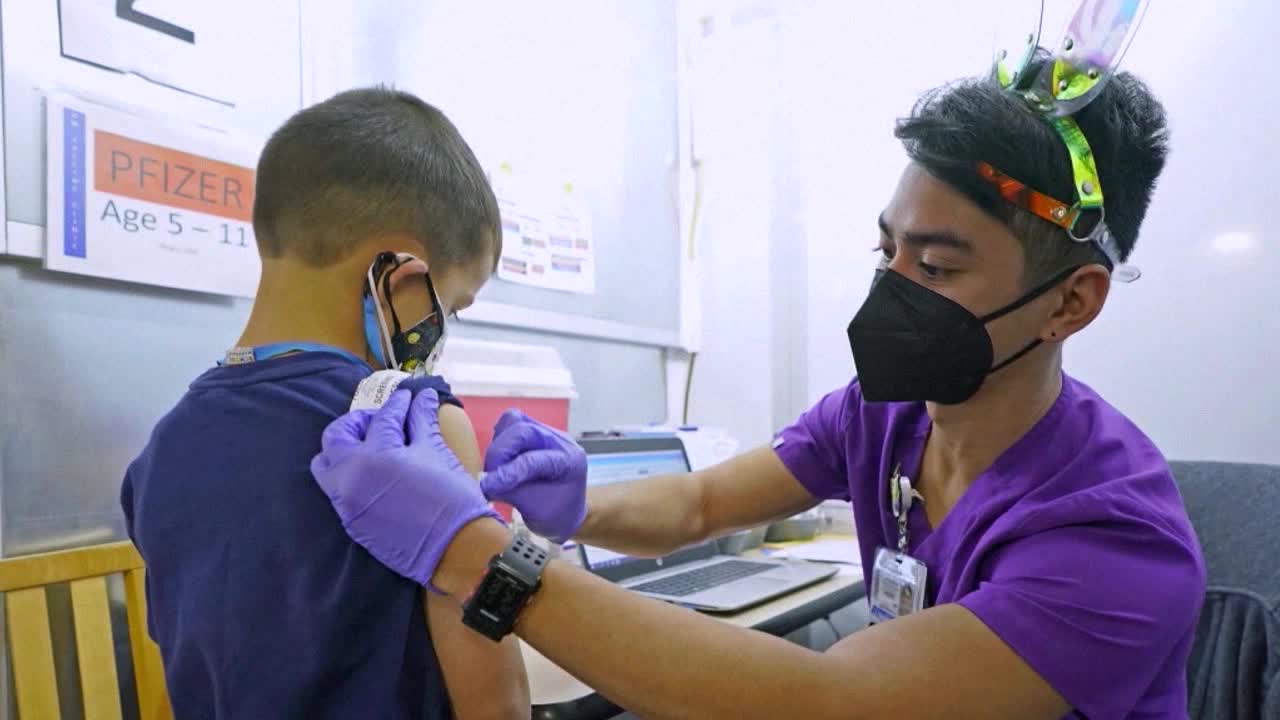COVID vaccination among youngest Minnesotans remains low
[anvplayer video=”5131962″ station=”998122″]
The youngest Minnesotans have been eligible to receive a COVID vaccine for about two and a half months. For children six months to four years old, a complete series is either three doses of Pfizer or two doses of Moderna.
“I feel really good about it,” said Amber Courteau, who lives in Minneapolis. “We got her vaccinated. She got her second shot a few weeks ago.”
Courteau’s daughter was born in the spring of 2021.
“I was pregnant during the pandemic and I was super scared for a lot of it when the vaccine wasn’t available,” she said. “I was just kind of waiting. I’ve been waiting a long time for it to be available for babies because we were scared to have her around people and family that weren’t vaccinated and other kids.”
She described her daughter’s post-vaccine symptoms as “a little bit of a fever,” but “she recovered well.”

(KSTP-TV)
Another Minneapolis mother, Patricia Lamas, told us her 20-month-old daughter didn’t have any symptoms after the vaccine. She has received two doses.
“I’d done the research and I knew it was what we wanted to do from the start,” said Lamas. “She has a heart condition so any effect from the vaccine for her probably wouldn’t have been worse than getting COVID for her, which we’ve been able to avoid.”
She added, “For her, it could’ve been a big deal getting COVID.”
Most Minnesota parents, however, aren’t getting their young children vaccinated. Minnesota Department of Health data shows only 11% of those six months to four years old have received their first dose. Only 2% of children in that age group have a complete vaccine series.
“Unfortunately, families haven’t been choosing the vaccine as much as we would like,” said Dr. Gigi Chawla, the chief of general pediatrics at Children’s Minnesota. “I think they continue to have some hesitancy of how needed it might be for their children.”
She explained that children’s risk of catching COVID would rise as families move inside for the fall and winter months. School also increases the possibility of exposure.
“The areas or the groups that we would honestly think about more COVID spreading is in the youngest age groups where there’s not a lot of kids vaccinated already so it can take hold,” said Dr. Chawla. “They don’t always respect boundaries as much as you’d like, they’re all over each other, so it’s a really easy way for a virus like COVID to be transmitted so really important for the youngest age group to get vaccinated.”
According to the CDC, fewer cases of COVID-19 have been reported among children than adults. Still, Dr. Chawla encourages parents to make an appointment for their children.
“Vaccinating even young kids who even may not experience a significant COVID illness really protects your whole family. It protects them and it protects the community,” she said. “Some kids do really get sick associated with it and need to be hospitalized. I think the vast majority of kids are going to do well with COVID illness but this vaccine ensures that all kids do well.”
Minnesota Department of Health data shows 40% of children five to 11 years old have a complete vaccine series. About 63% of children 12 to 15 and 66% of 16 to 17-year-olds have the complete vaccine series.
“The little bit of a slow start for each age group has been there — for 16-year-olds, for 12-year-olds, for 5-year-olds and older — and so I’m seeing that same pattern now for the youngest age group but I think the uptake is going to be there,” said Dr. Chawla.
Hayley Kreckelberg, who lives in Minneapolis, has been working to make an appointment with her son’s pediatrician.
“We haven’t gotten it yet, we plan to,” she said.
Kreckelberg told us she was excited when the vaccine became available for her nearly two-year-old son. She wasn’t surprised, however, that the vaccination rate is still low among the youngest children.
“Most parents with kids in that age group have said, ‘I am a little hesitant, I don’t know why, I don’t have any reason to be but I’m not rushing in to get it either because they’re kind of a low-risk group with getting sick with it too,'” she explained. “I guess it doesn’t surprise me a whole lot.”